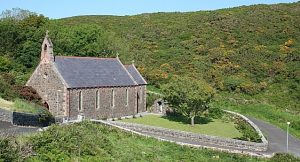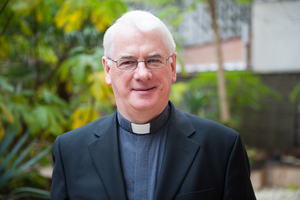
By Sarah Mac Donald - 28 March, 2017

Northern Ireland today needs the political ingenuity and restorative faith in humanity which was evident at the signing of the Treaty of Rome 60 years ago, Bishop Noel Treanor has said.
The Bishop of Down and Connor was speaking at the reopening of the Church of the Immaculate Conception on Rathlin island.
His comments on Sunday were made as hopes were fading for a resolution to the political impasse preventing the restoration of the Northern Executive and Assembly.
On Monday, the 4 pm deadline for a deal lapsed without any breakthrough. However, the Northern Secretary James Brokenshire indicated he would provide more time to see if the parties could resolve their differences.
On Sunday on Rathlin Island, Dr Treanor noted that the anniversary of the Treaty of Rome and the signing of the treaties that instituted the European Economic Community and the European Atomic Energy Community were being marked.
“These treaties marked a step taken by courageous political leaders, keenly aware of the risk of the trust they made in each other as former enemies, yet imbued with a steely determination to forge together the common good for generations to come,” he said.
He also recalled Pope Francis’ words last Friday in his address to the Heads of State and Government of the Member States of the European Union when he said, “I have devoted this first part of my talk to the founding fathers of Europe, so that we can be challenged by their words, the timeliness of their thinking, their impassioned pursuit of the common good, their certainty of sharing in a work greater than themselves, and the breadth of the ideals that inspired them.
“Their common denominator was the spirit of service, joined to passion for politics and the consciousness that ‘at the origin of European civilisation there is Christianity’, without which the Western values of dignity, freedom and justice would prove largely incomprehensible”.

Bishop Noel Treanor of Down and Connor
Sixty years later, “in the ebb and flow of human history and of our civilisation and societies’ movements, we stand in urgent need of that same political ingenuity and restorative faith in humanity at local level here in Northern Ireland, [and] in Europe at the level of our weakened institutions of global governance,” Bishop Treanor suggested.
Elsewhere in his homily, the Bishop of Down and Connor said of the restored church, which will serve the island’s 150-strong community, that he prayed it would “continue to offer an oasis where thirst of God and knowledge of Jesus Christ and faith-inspired contribution to society will grow and be fostered”.
The re-opening of the church was a reminder of the historic island congregation, which “constitutes a living cell of the universal Church”.
He said “We are a living cell of the family of peoples who make up the Church and the entire Christian people throughout the world and in the continuum of human history.”
He highlighted how on Rathlin Island throughout the centuries parishioners have gathered in prayer and worship.
Oral tradition and records recall that the people of Rathlin met for Mass in various locations, including in the shade of an overhanging rock at Ballynagarad, at a large stone in Kilpatrick, in a hollow called Lag an Sassanach and in this spot, the site of an old mill purchased by a Mr Alexander McDonnell in or around 1816 and converted into a church which was replaced by the present structure opened and dedicated by Bishop Patrick Dorrian in 1865 and renovated in 1989, Bishop Treanor said.
He said there was a shared responsibility for the vitality and concrete impact of the gospel, its values and vision, in our time.
Today Rathlin is part of a world and of a society which, for all the achievements of modernity, is now searching for, indeed sometimes screaming for, ultimate meaning, purpose and hope, Bishop Treanor said on Sunday.
“Living in the world-wide-web we cannot escape the questions and challenges of human existence in our times.”